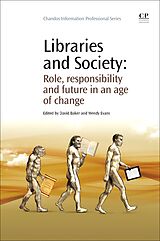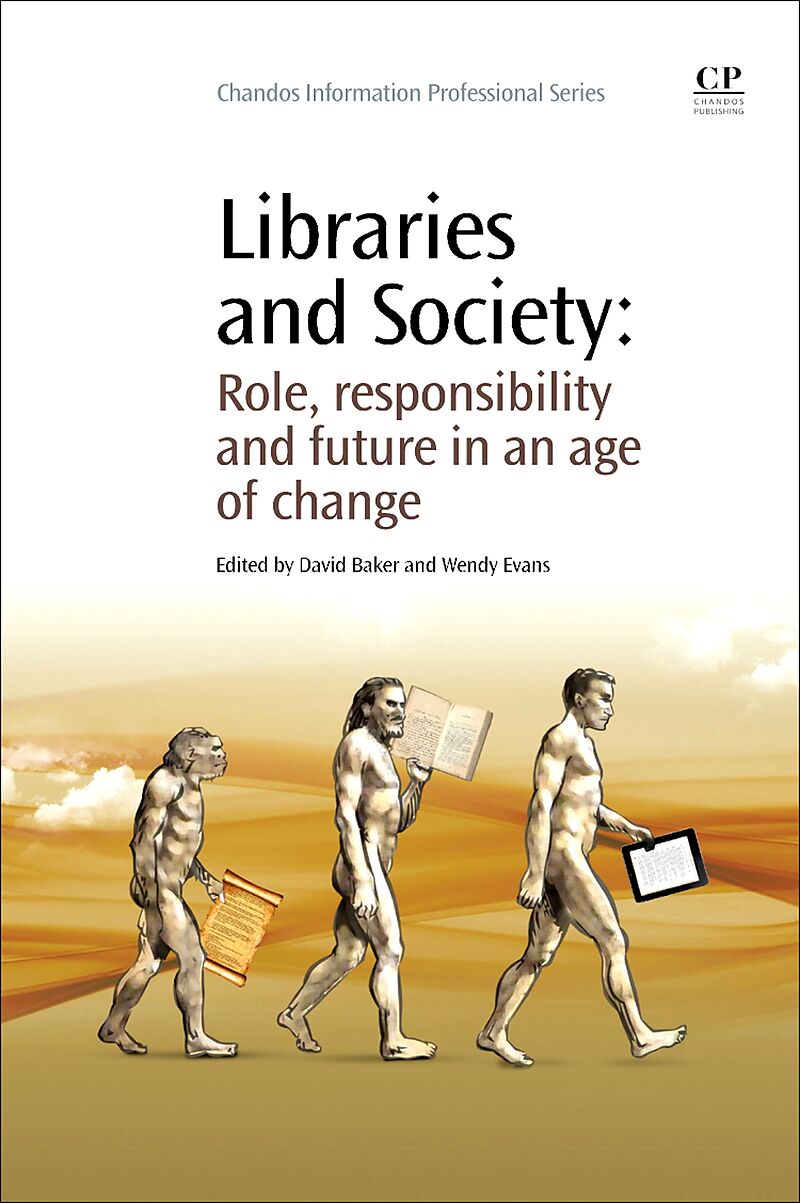Libraries and Society
Einband:
E-Book (pdf)
EAN:
9781780632636
Untertitel:
Role, Responsibility and Future in an Age of Change
Genre:
Sprach- und Literaturwissenschaft
Herausgeber:
Elsevier Science & Techn.
Anzahl Seiten:
472
Erscheinungsdatum:
30.04.2011
This book reviews both the historical and future roles that public, private, academic and special libraries have in supporting and shaping society at local, regional, national and international levels. Globalisation, economic turmoil, political and ethnic tensions, rapid technology development, global warming and other key environmental factors are all combining in myriad and complex ways to affect everyone, both individually and collectively. Fundamental questions are being asked about the future of society and the bedrock organisations that underpin it. Libraries and Society considers the key aspects of library provision and the major challenges that libraries - however defined, managed, developed and provided - now face, and will continue to face in the future. It also focuses on the emerging chapter in cultural, economic and social history and the library's role in serving diverse communities within this new era.Looks at all types of library in a period of major and discontinuous change, tackling the fundamental questions of the future of libraries in the context of major societal, political and environmental issuesPoses important questions for the profession and policy developmentFills a major gap in literature (recent discourse and debate on the future of democracy, for example, the library is rarely included)
Inhalt
Foreword Preface Acknowledgements List of abbreviations List of figures, tables and case studies About the authors Chapter 1: Libraries, society and social responsibility Introduction Future environment Technology push Equity and equality of access Education and digital literacy Library as physical space Value and impact Re-thinking the library Re-thinking librarianship Conclusion Chapter 2: I wouldn't start from here ... provision and use of UK libraries Introduction Library provision Library use Trends over time The wider world The wider context Conclusion Chapter 3: From people flows to knowledge flows Introduction: a brief review of People Flows The People Flows conclusions Today's learning context Working out alternatives Collaboration for access Knowledge flows - the lifelong library Library evolution in uncertain times Conclusion: how might this happen? Chapter 4: Scholarly communication and access to research outputs Introduction Journal prices Academic library journal provision Electronic information Issues of access Library access for external users Open access Open access journals Self-archiving Mandated deposit Impact on libraries Conclusion Chapter 5: Free and equal access: a conundrum for the information society Introduction Free libraries - for those who can afford them The price of free goods Freedom of access: rights and limits Access: equity and equality Conclusion Chapter 6: The more they change, the more they stay the same: public libraries and social inclusion Introduction What problem? What has changed? What has influenced libraries? An international perspective A strategy of urgent relevance Systemic and cultural change Political change Conclusion: or is it all a conspiracy ...? Chapter 7: Widening access to information: the haves and the have-nots? Introduction The digital divide Digital divide initiatives Technological infrastructure Uptake and use of ICT E-accessibility and design for all Education and training Conclusion Chapter 8: Tackling inequalities around the globe: the challenge for libraries Introduction The inequalities of information Overlooking libraries Bridging the divide: why information matters New opportunities - but also new challenges The technology gap Managing, maintaining and keeping up Access and use Skilling users and skilling staff Conclusion Chapter 9: Islands in the cloud: libraries and the social life of information Introduction A world of experience Taking apart architecture Making Creative Cities flow The social life of information 100-mile information diets Islands in the cloud Conclusion Chapter 10: From the passive library to the learning library - it's an emotional journey Introduction Change is needed A new focus integrated with current facilities It's subtle and it's emotional It's not optional: whatever space we create has emotional effects Conclusion: some useful types and metaphors Endnote Chapter 11: The modern academic library Introduction The new agenda: a focus on learning The exploitation of technology A new model for service delivery Conclusion Chapter 12: Libraries and distance education Introduction Distance learning: an African context Providing library services for distance education Developments in telecommunications Libraries and information literacy What is 'information literacy'? The implications of information literacy Conclusion Chapter 13: Syllabus independence and the library Introduction The United Kingdom Open University Syllabus independence Course design - why academics need libraries Conclusion Chapter 14: Libraries in the information society: cooperation and identity Introduction The Dutch library system The need for cooperation Towards a digital library of the Netherlands Conclusion: changing roles in a network of organisations Chapter 15: Children's reading habits and attitudes Introduction Children's reading habits and attitudes The involvement of parents in children's reading Preferences for reading materials Effect of new technologies Role of children's librarians Conclusion Chapter 16: The user of tomorrow: young people and the future of library provision Introduction Reading and literacy Children's reading and early literacy Libraries for children and young people Professional children's and schools librarians New libraries for children Conclusion Chapter 17: Redefining the librarian Introduction The library profession: a historical perspective Promoting the profession Redefining the librarian Looking forward Conclusion Chapter 18: Redefining librarianship Introduction Background The present day Professional status and membership Reviewing the profession Four dimensions of future professional practice Advocacy, leadership and representation Social analysis and the evidence base Context and environment Conclusion Chapter 19: The future of librarians in the workforce: a US perspective Introduction Projections of supply and demand for librarians IMLS-sponsored study on the future of librarians in the workforce Demand for librarians Reasons for librarians leaving the library workforce Supply of librarians Age of graduating librarians Increased competition for librarians US librarians and libraries during recessions Attitudes towards library and information science (LIS) education Attitudes towards work-related issues Attitudes toward librarianship Trends in librarian co…

Leider konnten wir für diesen Artikel keine Preise ermitteln ...
billigbuch.ch sucht jetzt für Sie die besten Angebote ...
Die aktuellen Verkaufspreise von 6 Onlineshops werden in Realtime abgefragt.
Sie können das gewünschte Produkt anschliessend direkt beim Anbieter Ihrer Wahl bestellen.
Loading...
Die aktuellen Verkaufspreise von 6 Onlineshops werden in Realtime abgefragt.
Sie können das gewünschte Produkt anschliessend direkt beim Anbieter Ihrer Wahl bestellen.
| # | Onlineshop | Preis CHF | Versand CHF | Total CHF | ||
|---|---|---|---|---|---|---|
| 1 | Seller | 0.00 | 0.00 | 0.00 |
